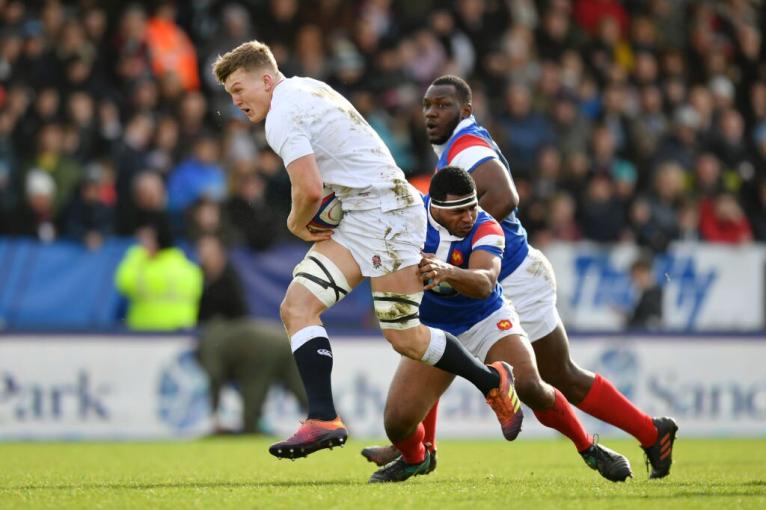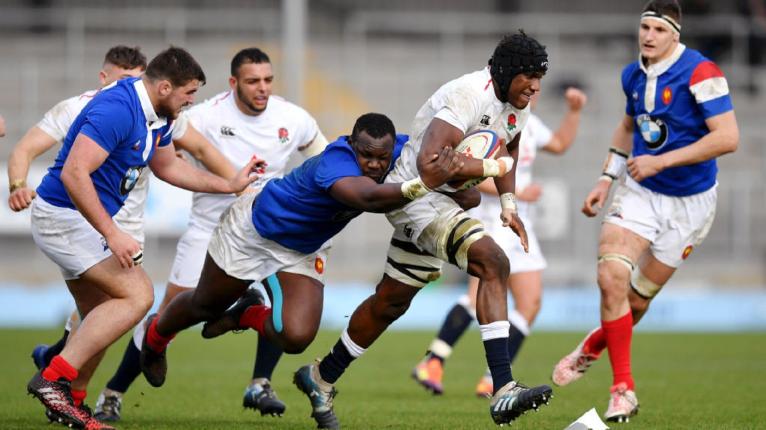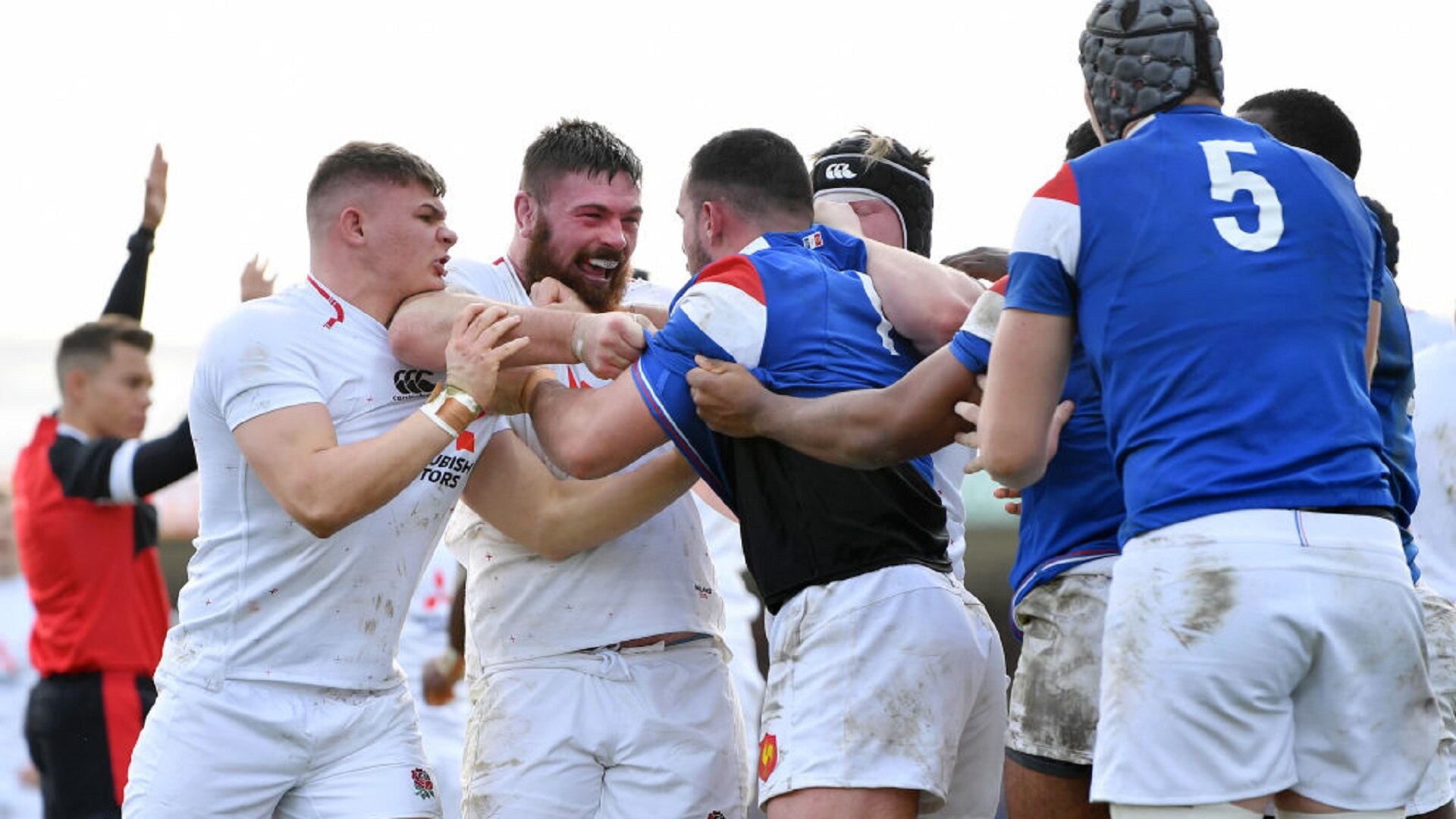After one win and one loss, where are England U20s at in their bid for success?

There will have been some sore egos in the England U20 camp in the aftermath of their 35-27 opening round loss to Ireland in Cork, as the hosts not only beat the visitors, but also denied them any match points from the game.
There were extraneous variables at play that are undeniable, such as the fact England’s 23 was brought together from 12 different clubs, with only Bristol Bears and Bath not among those represented, and that they had no warm-up matches in the build-up to the tournament.
Conversely, Ireland were drawing their side from four provinces and the group already had two games under their belts, after they’d seen off both Leinster Development and Munster Development at the end of 2018.
That inability to create instant cohesion is one of the reasons why England regularly start the age-grade season slowly but that being said, nothing should be taken away from what was an exceptionally resilient Irish performance in their home opener, nor would they likely turn down England’s player pool in exchange for a little less preparation time.
Continue reading berlow…
Captain David Hawkshaw had been talked up previously, openside Scott Penny was getting positive reviews from his involvement with the senior Leinster side and fly-half Harry Byrne was back after an impressive 2018 season. What really stood out for Ireland in that contest, however, was the emergence of players around those three more well-known operators.
For years, Leinster have dominated the U20 pathway in Ireland, but the quartet of John Hodnett, Craig Casey, Josh Wycherley and Jake Flannery look like an impressive group that Munster can build around in the years to come, whilst Connacht hooker Dylan Tierney-Martin was in the mix for the most impressive performer in that game.
It was a game in which Ireland weathered an early England onslaught, stayed in the game and gradually began to exploit the visitors’ lack of chemistry as a unit, with an effective set-piece, turnover-creating defence and a clinical streak with the ball in hand.
That Irish performance deserves a lot of credit and they’re ability to back it up a week later in Scotland goes to show that they can be a force in U20 competition this season, but that will not diminish the hurt the England camp will have felt from the defeat.
They are notoriously slow starters and it was an away game against a strong, cohesive group, but this England side know they’re ceiling is high and that they have the firepower in their ranks to beat anyone at this level.
It’s not arrogance, it’s just self-awareness. How could you not know you’re a decent outfit when the starting midfield from their match a week later against France – Marcus Smith, Cam Redpath and Ollie Lawrence – have all been involved in senior England training camps? You can throw second-year lock Joel Kpoku into that category as well, whilst starting blindside Ted Hill even has a senior international cap, after he made his debut against Japan last year.

Unfortunately for France, the backlash to that loss was rather significant and it was the reigning World Rugby U20 Champions who were on the receiving end of it at Sandy Park on Saturday.
Again, England were still not the cohesive group that they will most likely be come the summer and they left a fair share of points out on the pitch, but the 31-19 scoreline really doesn’t give a true reflection of the dominance they had in that contest.
To see an age-grade French pack so brutally beaten up in the set-piece was stunning. There really isn’t another word for it.
That pack welcomed back Jean-Baptiste Gros from last year’s group, with the loosehead having broken through with Toulon since also, and whilst it was not the same unit without Demba Bamba or a couple of the second rows who were missing through injury, no one expected them to capitulate in the way they did.
For England, this was the redemption they craved, not only from the opening loss to Ireland, but also the loss to a number of these same French players in the World Rugby U20 Championship final in Beziers last year.
Exeter Chiefs tighthead Marcus Street tore into Gros repeatedly, ultimately sending the Frenchman to the sin-bin, whilst Ollie Adkins and Nic Dolly had similar success in the front row, with Kpoku and Alex Coles providing the ballast behind. As one-sided scrummaging contests go, you’re unlikely to see a more comprehensive beat-down than this one.
In some ways, though, that emphatic set-piece mauling arguably held England back. There was so much focus on the dominance that was being exerted in that area and an unrelenting desire to drive France back and essentially wrestle them into submission, that some opportunities to get the ball wide with tempo, and allow Redpath and Lawrence to test the gain-line, went untaken.
As a starting trio, Smith, Redpath and Lawrence went well. They linked up effectively and looked to be on the same page, albeit without being required takeover the game themselves. The back three of Josh Hodge, Ollie Sleightholme and Arron Reed also had their moments, but as with the midfield, it was a forward-dominated game from start to finish.
One of the key takeaways from the game was the leaps that a number of players had made in their second years at this level, with Gloucester’s Aaron Hinkley one of England’s more impressive performers in Cork, before picking up a well-earned man of the match award in Exeter. He seems more physical and more confident with the ball in hand than he was in 2018, both as an offloader and with his incisive running lines. Street is scrummaging straighter and resisting even the most acute angles from looseheads, whilst Hill and Kpoku just look more comfortable and at ease with themselves at this level.

The championship now takes a more interesting turn for England, with the Gallagher Premiership resuming this weekend and the U20s likely to lose a number of players to club duty. Smith and Hill will definitely be required by Harlequins and Worcester Warriors respectively, whilst the likes of Kpoku, Lawrence and Tom Hardwick could also be needed due to senior international call-ups. You can probably add the pair of Cadan Murley and Fraser Dingwall, if fit, to that list also.
The next three games, which see England make a trip to Colwyn Bay to take on Wales, before hosting Italy and Scotland in the final rounds, will give a strong indication of where they are at going into the World Rugby U20 Championship in Argentina this summer. The likes of Smith, Hill and Kpoku can perform at this level and whilst the England U20 coaches would surely love to have them in the group, building chemistry, they won’t have any qualms about bringing them back in for the preparation in the summer, as they are more than capable of playing catch up at that point.
Now, Steve Bates, Richard Whiffin, Mark Hopley and James Scaysbrook get to delve a little deeper into their pool of players and experiment with combinations, something which has long been a hallmark of how England use the Six Nations at this level.
If both Smith and Hardwick are required for Premiership rugby, does Bath’s Tom de Glanville get the keys at 10 or will they move Redpath inside, should he not be required by Sale Sharks?
Rus Tuima has shown his enviable ability from the bench and with Hill gone, could Tom Willis slide over to six to make way for Tuima in that back row? That pair coupled with Hinkley would make for some unit, or could the call go out to Andy Christie at Saracens, with the versatile loose forward having missed the start of the competition with injury? His ability to cover all three positions in the back row would be extremely valuable in Argentina.
This is often where England make the most of their advantage in the tight turnarounds of the U20 Championship, boasting a depth of player that allows them to strategically rotate and manage the workload of the competition, without sacrificing results or even try bonus points in the process.
England have the top-end quality to be successful in the summer and, on paper, it looks as though they have the depth, too, but the next three rounds of competition will give a much more valid insight into that.
Watch: Eddie Jones and Owen Farrell speak to the press after the game with France at Twickenham














































































